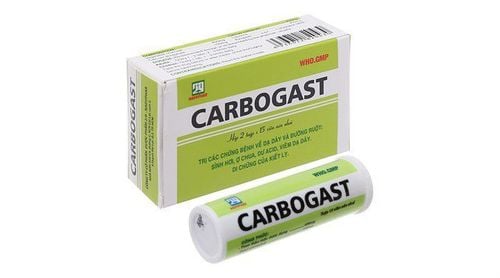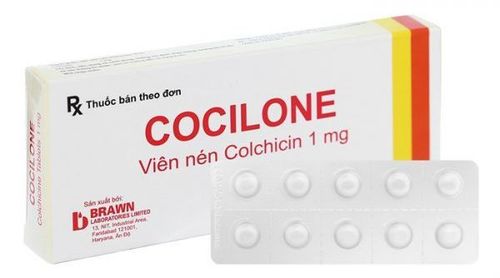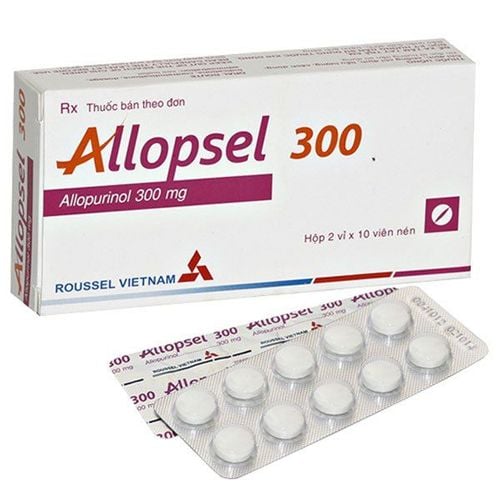This is an automatically translated article.
Alloflam 100 is indicated for the treatment of hyperuricemia in cases of gout or kidney stones. So how is Alloflam 100 used? What is the note when using? Please read the article below for more detailed information.
1. What is Alloflam 100?
Alloflam 100 contains the main ingredient Allopurinol 100mg and excipients just enough provided by the manufacturer. The drug is prepared in the form of tablets, packing in box form of 10 blisters, each blister of 10 tablets.
Effect of active ingredient Allopurinol:
Allopurinol reduces blood uric acid levels mainly by competitively inhibiting uric acid synthesis in the urine, so there is less risk of kidney stones and renal colic. Mechanism of action of Allopurinol: The drug inhibits the enzyme xanthine oxidase, which is the enzyme responsible for converting the precursors hypoxanthine and xanthin to uric acid, thereby reducing blood uric acid levels.
2. Uses of Alloflam 100
Alloflam 100 is indicated for the treatment of cases such as:
Treatment of Gout. Prevention of uric acid nephropathy during cancer treatment. Control of recurrence of calcium stones in patients with increased urinary uric acid excretion. Alloflam 100 is contraindicated in the treatment of patients who are:
Allergic to the active ingredient Allopurinol or other excipients in the composition of the drug. Acute gout.
3. Dosage and how to use Alloflam 100
The drug is in the form of tablets, used orally. The drug should be taken with water and taken after meals. Divide the medicine into several times a day to take to reduce stomach irritation.
Below is the recommended dose of Alloflam 100:
Adults:
Mild gout use 200-300mg/day, severe 400-600mg/day. For acute exacerbations, the minimum effective dose is 100-200mg/day, the maximum dose is 800mg/day. Prevention of uric acid nephropathy when treating cancer: Use at a dose of 600-800mg/day, continuously for 2 or 3 depending on the doctor's instructions. Control of recurrent calcium stones in patients with increased urinary uric acid excretion: 200-300mg/day, adjust dose based on 24-hour urinary urate excretion. Patients with hepatic impairment: The dose of Alloflam 100 should be reduced in patients with hepatic impairment and liver function should be checked periodically during the initial phase of treatment. Patients with renal impairment: The drug is excreted mainly by the kidneys, so the dose should be reduced based on creatinine clearance (CC), in case of CC from 10-20ml/min, dose 200mg/day, CC less than 10ml/min dose not exceeding 100mg/day. Children: Alloflam 100 is used in children in the treatment of hyperuricemia associated with cancer or chemotherapy associated with enzyme disorders.
Use at a dose of 150mg per day for children under 6 years old. Use at a dose of 300mg per day for children 6-10 years old. The dose can be adjusted 48 hours after dosing if necessary. The above dose is for reference only, depending on the condition of each patient, the treating doctor will prescribe the appropriate dose. Therefore, the patient should take the medicine exactly as prescribed by the doctor.
4. Alloflam 100 . side effects
Before prescribing, doctors always weigh the effectiveness benefits that Alloflam 100
brings more than the risk of unwanted effects on patients. However, some cases when using Alloflam 100 may still occur undesirable effects such as:
Nausea, diarrhea; Skin rash with mild fever; Increased alkaline phosphatase; Increase liver enzymes ; Gout exacerbations; Blistering papules. While taking the drug, if the patient experiences the above undesirable effects or the unusual signs are suspected to be related to the drug, immediately notify the doctor for specific advice. In case the side effects do not improve and get worse, it is necessary to take the patient to the nearest medical facility for supportive intervention and appropriate symptomatic treatment.
5. Alloflam drug interactions 100
Please list and inform your doctor about all medications you are taking to avoid possible interactions when combining different drugs.
The following are some drugs that have the potential to interact with Alloflam 100 when used in combination such as:
Avoid combination with Aspirin and Salicylates that can increase uric acid levels, reducing the effect of Alloflam 100. There is a risk of hypersensitivity reactions when used concomitantly with ACE inhibitors or thiazide diuretics. Alloflam 100 increases the effect and causes toxicity when combined with some antibiotics, anticoagulants, anticancer, sulfonylurea diabetes drugs, immunosuppressants and gout treatment.
6. Some notes when using Alloflam 100
Here are some notes when taking Alloflam 100 to help improve the effectiveness of treatment as well as reduce the risk of experiencing side effects:
Do not use Alloflam 100 to treat acute gout attacks or supplement this drug. during an acute gout attack. However, treatment with Alloflam 100 should be continued in the event of an acute gout attack in patients taking the drug and the acute gout attack should be treated separately. Treatment should be discontinued immediately if any skin reactions or other signs of hypersensitivity occur. This drug should not be reused in patients with other hypersensitivity reactions. Dosage should be reduced in patients with hepatic or renal impairment. Use with caution in patients being treated for hypertension or heart failure because of possible renal failure. Patients should drink plenty of water from 2 to 3 liters per day to prevent xanthine deposition in the kidneys. Furthermore, urine should be neutral or slightly alkaline. Alloflam 100 should be used with caution during pregnancy and lactation, unless specifically directed by a doctor after weighing the potential benefits and risks to the fetus and young child.
7. How to deal with missed dose, overdose of Alloflam 100?
What to do if you forget a dose of Alloflam 100?
Take another dose as soon as you remember, maybe 1-2 hours after the usual time. If you remember the missed dose, it's close to the time you take it, skip the missed dose and take the next dose as directed. Do not make up for a double missed dose. What to do in case of an overdose of Alloflam 100?
In case of overdose, patients may experience symptoms such as nausea, vomiting, diarrhea and dizziness. Immediately bring the patient to the nearest emergency center for treatment. Treatment: The ingestion of large doses of Alloflam 100 can lead to significant inhibition of xanthin oxidase activity, which may not cause adverse effects in the case of concomitant use with other drugs, especially with 6-Mercaptopurine and or Azathioprine. Sufficient water intake to maintain optimal diuresis facilitates drug elimination. Hemodialysis can be used if prescribed by a doctor. Above is the important information of Alloflam 100, carefully reading the instructions before use and strictly following the doctor's instructions will help patients use the drug effectively and safely.
Please dial HOTLINE for more information or register for an appointment HERE. Download MyVinmec app to make appointments faster and to manage your bookings easily.













